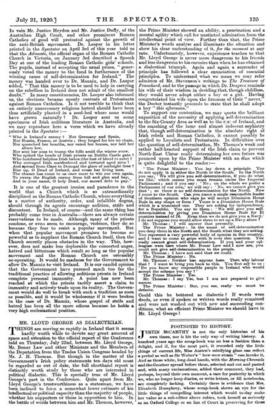MR. LLOYD GEORGE AS DTALECTICIAN.
THINGS are moving so rapidly in Ireland that it seems hardly worth while to devote any great amount of space and attention to the official report of the Conference held on Thursday, July 22nd, between Mr. Lloyd George, Mr. Bonar Law and other 'Ministers and the Members of the Deputation from the Trades Union Congress headed by Mr. J. H. Thomas. But though in the matter of the Government's Irish policy statements ten- days old must be regarded as out of date, the full shorthand report is distinctly worth study by those who are interested in political dialectic. This is specially true of Mr. Lloyd George's part in the Conference. Quite apart from Mr. Lloyd George's- trustworthiness as a statesman, we have been inclined to form a somewhat lower estimate of his Intellectual or political capacity than the majority of people, whether his supporters or those in opposition to him. In the battle of words between him and Mr. Thomas, however, the Prime Minister showed an ability, a penetration and a mental agility which call for unstinted admiration from the intellectual point of view. Further than that, the Prime Minister's words analyse and illuminate the situation and show his clear understanding of it, for the moment at any rate. Unfortunately, however, experience teaches us that Mr. Lloyd George is never more dangerous to his friends and less dangerous to his enemies than when he has obtained a dialectical triumph. Again and again a surrender of principle has followed a clear enunciation of essential principles. To understand -what we mean we may refer admirers of Mr. Stevenson's writings to The Treasure of Franchard, and to the passage in which Dr. Desprez reminds his wife of their wisdom in deciding that, though childless, they would never adopt either a boy or a girl. Having congratulated his wife upon the firmness of their " never, the Doctor instantly proceeds to state that he shall adopt a boy " this afternoon."
To support our contention, we may quote the brilliant exposition of the necessity of applying self-determination to the Six-County Area as well as to the rest, of Ireland, and the smashing of the lame and almost indecent sophistry that, though self-determination is the absolute right of Irish rebels and Roman Catholics, it cannot possibly be applied to Loyalists and Protestants. In difficulties over the question of self-determination, Mr. Thomas's weak and rather half-hearted support of the Irish claim to prevent North-East Ulster really determining her own future was pounced upon by the Prime Minister with an elan which is quite delightful to the reader :- " The Prime Minister : You lay down a principle. You do not apply it in either the North or the South. In the North you say, We will give you self-determination, if you do what we like,' which means you must remain under the Imperial Parliament ; and if you say : No ; on the whole we prefer a Parliament of our own,' we will say : ' No, we cannot give you that' ; so there is no self-determination for the North. Now I come to the South. Can you name a single responsible leader of Southern opinion who says he wiJi accept Dominion Home Rule in any shape or form ? Yours is a Dominion Home Rule which is a truncated one. They are asking for independence, for a Republic. You .say to them : We will give you se f - determination by giving you Dominion Home Rule for 2
counties instead of 26. then we do not give you a Navy I do not suppose you would allow them to set up a Navy alone Mr. Thomas I will answer that presently.
The Prime Minister : In the name of self-determination you deny them in the North and the South what they are asking. You represent 4Ir very powerful body of opinion in this country, and I want • to come to grips with it over this question. You really cannot grant self-determination. If you and your col- leaguse were- here where Mr. Boner Law and I now are, you could not give self-determination to the people.
Mr. Thomas : I have not said that we could.
The Prime Minister : No.
Mr. Thomas : Neither has anyone here. Than why labour that ? I want to bring you back to- this. You first sE4r to us : Do you know any responsible people in Ireland who would accept the scheme you say ?
The Prime Minister Yes.
Mr. Thomas : I say Yes, but I am not prepared to give names.
The Prime Minister : But, you see, really we must be -definite.
Could this be bettered as dialectic ? If words were -deeds, or even if spoken or written words really remained and were not washed out with new and succeeding con- ditions, what an efficient Prime Minister we should have in Mr. Lloyd George


































 Previous page
Previous page